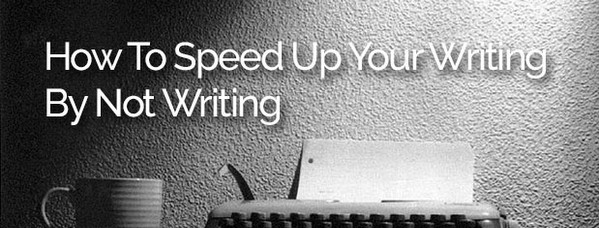Stephanie Palmer: Writing is hard. No writing is easy

Writing is hard. No writing is easy. But what if avoiding your writing could be integrated into the writing process— and you created better work more quickly as a result?
The process of writing by not-writing is called “incubation.”
Incubation Is NOT Procrastination
The activities you use to procrastinate or incubate may be the same: meditate, take a bath, go for a walk, bake cupcakes, watch TV, clean out the garage, go to the gym….
Procrastination is where you’re doing the activity but still thinking about the project (e.g., lamenting that you’re not working on it). Often procrastination happens when you run out of willpower to keep writing—and you kind of wish you weren’t procrastinating because it’s not helping you succeed.
Incubation is where you purposefully stop working, and use a strategy to let the project “cook” in your unconscious mind while you do something else.
I know that it’s not easy to redirect your attention when you’re immersed, when you care, and (especially) when you have a deadline. However, when you return to your project and you’re fresh, you can get more work done in a lot less time and with a lot less effort.
There are two key principles that can help you turn your procrastination into incubation.
Principle #1: Incubate Before You Get Stuck
Yes, incubating is a great way to break through writer’s block, but it’s an even better way to sustain momentum.
Before you get stuck in a project, while you still have the mojo, take a break and incubate your work so it’s still fresh and exciting when you pick it back up.
What are your criteria for deciding when it’s time to incubate a project? For some writers, it’s when they reach their word or page count for the day. For others, it’s more about when they start to feel like the words aren’t coming quite as fast.
The point is to have a plan of some sort. Incubation works best when you decide when you’ll put your work down instead of being forced to stop by fatigue, doubt, or creative confusion.
Principle #2: Incubate Between Creative Processes
The creative process has several phases. Let’s divide them into “right-brain” (creative) and “left-brain” (critical).
- Right-brain: brainstorming, drafting, or outlining.
- Left-brain: testing, editing, and polishing.
Let’s say that the process of creating a film, TV pilot, or novel goes through a process that, in broad strokes, alternates between right-brain and left-brain phases, and looks something like this:
- Come up with the idea
- Brainstorm related ideas
- Draft short pitch
- Test short pitch on feedback group 1
- Draft revised short pitch
- Test revised pitch on feedback group 2
- Outline the project
- Edit outline
- Draft revised outline
- Edit revised outline
- Draft 3-page complete summary of project
- Test summary on feedback group 3
- Draft treatment
- Edit treatment
- Draft project
- Edit project
- Test project on feedback group 4
- Polish project
- Submit for professional feedback
Consider incubating between engaging in right-brain and left-brain processes. Even taking a very short break can help you to focus on being creative or critical–but not both. It’s incredibly hard to be creative and critical at the same time.
Be A Writing Athlete
Athletes know that if they train too hard, they can burn out and inhibit their progress. They are very careful to build rest into their training programs in several different ways: between sets, between workouts, using “active rest,” and periodizing exercises and training programs.
It’s similar in creative work. Our creative and critical faculties—and even the muscles in our hands—benefit from purposeful rest that is built in to our training.
Incubation can help you be more productive because rest is crucial to growth and insight.

